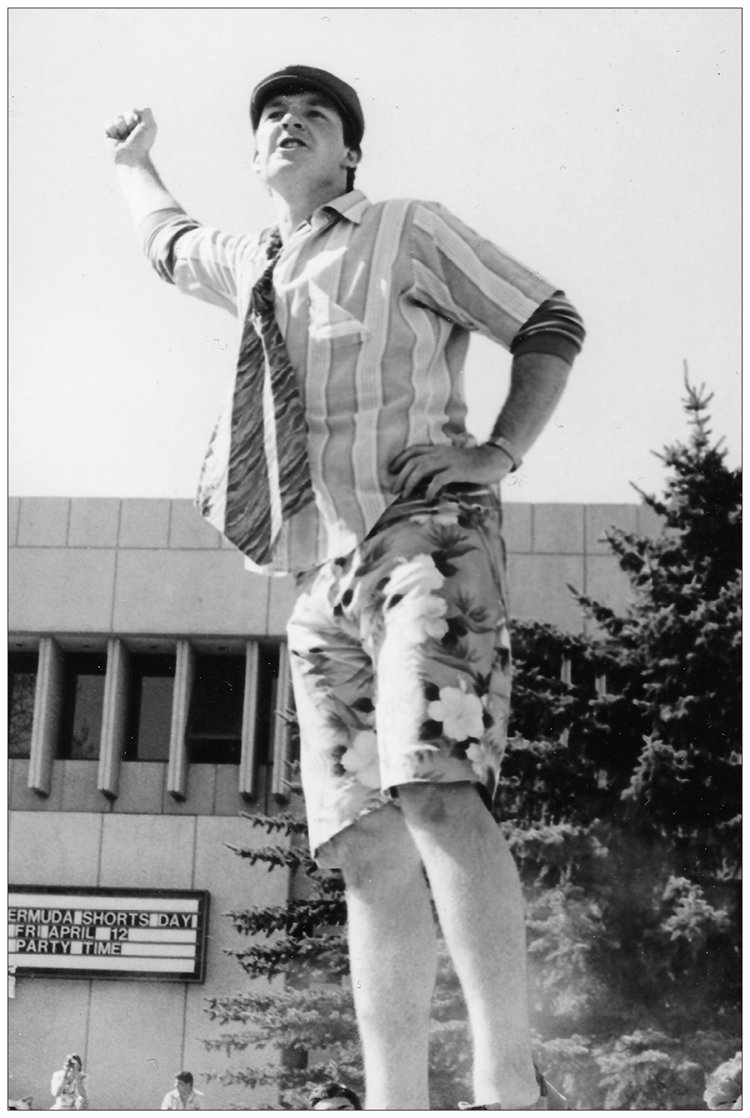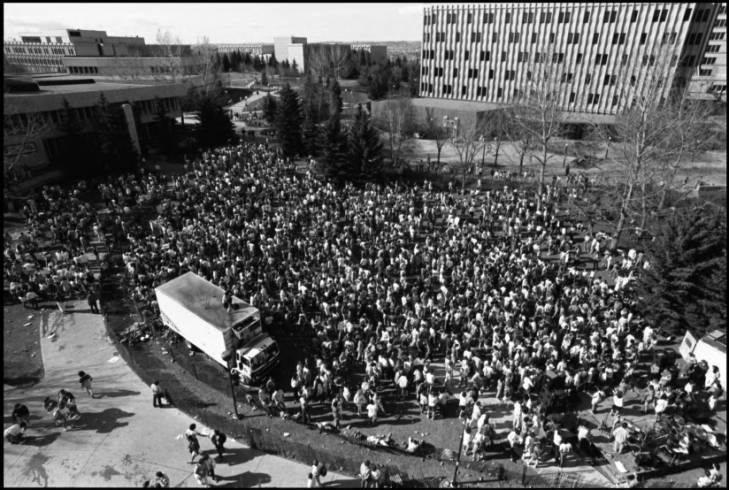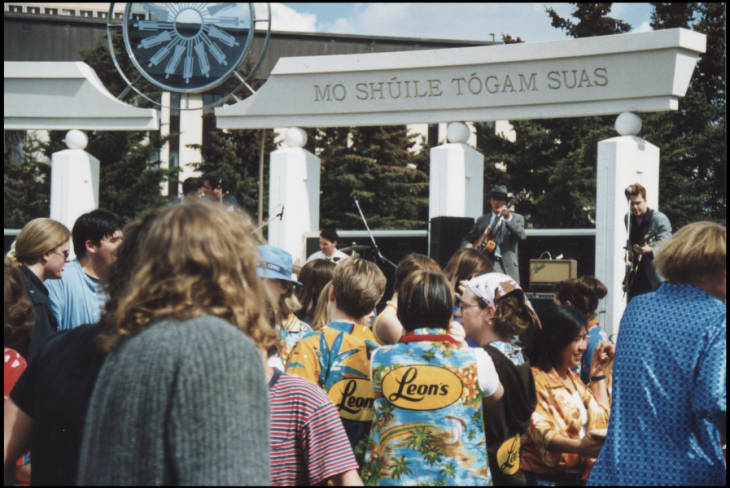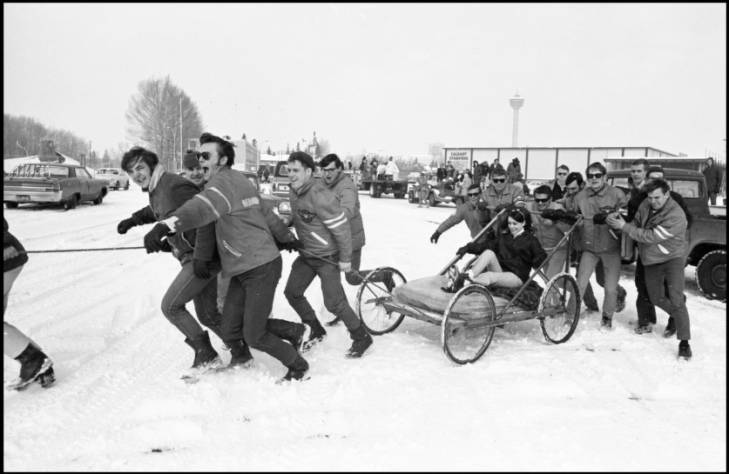
The growing financial unsustainability of Bermuda Shorts Day
By Jason Herring, April 3 2018 —
This year, the Students’ Union implemented paid entry to their annual Bermuda Shorts Day event in response to the growing cost of hosting the festivities. In 2017, the union lost over $88,000 putting on the event. What caused the iconic undergraduate event to start hemorrhaging money and what does that mean for the future of a beloved campus tradition?
[hr gap=”1″]
As an end-of-year student tradition Bermuda Shorts Day outlives the University of Calgary itself. The festivities date back to 1961, five years before the U of C became independent from the University of Alberta. Alan Arthur, a campus freshman and an incoming editor of the Gauntlet, had just bought his first pair of Bermuda shorts and wanted to celebrate spring with his classmates. He wrote a message on the blackboard in the school’s main hall: “Everyone wear Bermuda Shorts.”
“Many of the university’s 250 students did,” reminisced Maurice Yacowar, another former Gauntlet editor, in 2005. He recalled spending the day in “various juvenile frolics,” including being a finalist in a marbles competition. For a small group of students at a brand-new and sparsely populated campus, the day served as a sort of coming-of-age.
“Paradoxically, we declared that new independence and maturity through a day of silliness that we could not have gotten away with in high school,” Yacowar continued. “We felt older for the freedom to act juvenile.”
Bermuda Shorts Day has evolved a lot since then. In the 1980s, a travelling tiki bar allegedly dispersed drinks to students across campus. A recently shuttered tradition saw engineering students race couches down the hill in Saint Andrews Park. Most notably, in 1989 the U of C asked the Students’ Union to contain some of the day’s chaos by hosting a single celebration on campus, but even that core event has seen its fair share of change.
These days, BSD is characterized by students taking swigs from flasks in the back of last-day-of-class lectures, walking around campus in gaudy and elaborate outfits and attending the SU’s parking-lot beer gardens. This year’s celebrations on April 13 look to deliver much of the same debauchery that’s come to be expected in past years.
This year, however, BSD is at a crossroads. Citing increasing costs to host the event coupled with a lack of co-operation from U of C administration and a decline in alcohol sales, the SU implemented a ticket cost for their BSD event for the first time ever this year. The first 5,000 students who purchase their admission online before April 6 will pay $5; afterwards, the SU will sell additional wristbands for $10 in MacHall from April 9–12 in the MacHall North Courtyard.
[hr gap=”1″]
The U of C first began charging the SU for use of the Lot 32 parking lot on the southeast corner of campus in 2009. Previously, BSD usually took place in the green space south of MacHall. The construction of the Taylor Family Digital Library, however, forced the event to move. The university charges the SU the value of every stall in addition to services like traffic workers and signage. In 2017, those costs amounted to nearly $10,000.
In 2009, the SU dealt with the heightened costs of relocating BSD by obtaining $90,000 over three years from Quality Money, a joint program between the SU and the U of C that provides money to programs that “enhance the student experience.” Funding BSD through Quality Money created controversy at a time as many students and elected SU officials argued that using university money to pay for a student party was inappropriate. Alternatives, including paid admission and a smaller event, were considered.
 Though Quality Money served as a temporary solution back when BSD was first hit with unexpected extra costs, current SU vice-president operations and finance Ryan Wallace doesn’t believe it’s the right course of action now. Still, he doesn’t discount any options.
Though Quality Money served as a temporary solution back when BSD was first hit with unexpected extra costs, current SU vice-president operations and finance Ryan Wallace doesn’t believe it’s the right course of action now. Still, he doesn’t discount any options.
“In terms of exploring things like Quality Money, I think we’re willing to explore any option,” Wallace said. “But I’m not too sure that aligns with the purpose of Quality Money.”
Discussions of making BSD a pay-to-enter event have persisted since the event’s venue change in 2009. Several former SU executives, including 2016–17 vice-president student life Patrick Ma, confirmed having discussions about introducing tickets to mitigate some of BSD’s ever-increasing financial losses. In those instances, push-back from executives prevented the SU from implementing the changes. But now, according to Wallace, the organization can no longer justify routinely running losses that are ballooning towards six-figures. He says the biggest concern comes from the potential of the deficit to start taking money away from other SU services.
“We don’t want the deficit from BSD to run into other programming run by the SU and where the levelling is getting to now, it’s starting to get to that point,” Wallace told the Gauntlet at the time of the BSD ticket announcement.
[hr gap=”1″]
Two other major changes contributed to the continually increasing costs of hosting the Bermuda Shorts Day event for the SU. The first increased costs of security. In addition to paying for their own security at the beer gardens they host, the SU also pays for Campus Security and Calgary Police Service officers to patrol the campus at large. Over the last three years, the SU has spent about $7,000 annually on Campus Security and about $18,000 annually on CPS. According to Wallace, this is a requirement set by the U of C for the SU to hold the event. The U of C currently does not contribute to the cost of increased security around campus during BSD.
The SU has taken a notably combative stance with the U of C when talking about the costs of security. “The university is unwilling to help us with expenses related to the event, even though they benefit from the event being put on,” reads a line on their website’s ‘frequently asked questions’ section. Wallace also expressed frustration with the school’s stance on security for the event.
“It’s a well-known fact that students drink on the last day of classes. Our proposal has been to the university that we should share in those costs a little bit more or they should be covered more by the university, as they’re monitoring the larger campus,” he said. “Our responsibility is the event and we cover the security costs for that.”
The U of C did not grant the Gauntlet an interview with Campus Security officials to discuss security arrangements for BSD. However, in a 2016 UToday article titled “Correcting with facts: BSD and the Den,” the school contends that they already help cover much of the security expenses.
“The SU does not pay for all security and CPS presence on campus on the last day of classes. The university also covers a significant portion of the expenses,” the article reads. “However, the SU pays for additional security and CPS personnel associated with the beer gardens, but it does not pay for the full complement of campus security during this day. The remaining portion is paid for by the university.”
The other major contributor to BSD’s growing deficit is a decline in bar sales. Over the last five years, the amount of drink sales in the beer gardens has fallen significantly. In 2013, students bought an average of about three drinks during BSD. That number fell to an average of about one-and-a-half drinks in 2017. Though inclement weather was partially to blame for low attendance in 2017, these decreasing bar sales were the main contributor to an almost $30,000 decline in revenue over that five-year period.
Those trends are similar to decreasing alcohol sales at events like the University of British Columbia’s Block Party, an event whose 2016 iteration ran a deficit over $200,000. Generally, students seem to be drinking less now both at students’ union-hosted events and at students’ union-run bars than in past years. The latter is evident at both McMaster University, whose students’ union partially switched their food-service efforts from beer to coffee and at the SU’s Den and Black Lounge, which has notably shifted its marketing away from alcohol and towards food. The reasons for the decline in on-campus bar sales is unclear — though various sources for this story speculated that increased pre-drinking or declining drinking overall among university students was to blame, there’s little evidence to support any theory.
A similar issue is the closure of the SU’s bar, The Den, on BSD. The SU closes the restaurant because they say the U of C requires additional security changes for the area around The Den if they serve alcohol. Those costs were too high, according to 2015–16 SU president Levi Nilson, who tried to open The Den on BSD in 2016 but was told by the U of C that they would revoke the SU’s liquor license if they went through with operating the bar.
The Den has not opened during BSD since 2009. The SU now says they want to keep The Den open in order to generate some offsetting revenue but that the U of C won’t let them do so. The U of C declined to provide additional comment on The Den, instead citing the same UToday article mentioned above, which says that the event’s move to lot 32 was predicated on The Den not being open during BSD.
Despite the dire situation it now finds itself in, BSD wasn’t always a drain on the SU’s finances. Decade-old Gauntlet articles routinely refer to the event as one of the SU’s “biggest profit-generating events,” though Wallace disagrees with the notion that BSD was ever profitable.
“BSD has never really made money. It’s always kind of been at par with the expense,” he said.
Though Wallace wasn’t sure of the first year that BSD ran a deficit, he cited 2009’s change in venue as the point in which costs started to become tough to manage.
“That’s when things started to become less manageable for the SU and when we started to question the sustainability of the event,” Wallace said.
[hr gap=”1″]
The future of BSD is anything but certain. Wallace wasn’t keen to speculate on the long-term outlook of the festival, saying that the outcome of this year’s event and student response to ticket prices will shape next steps for the SU.
Patrick Ma, 2016–17 SU vice-president student life, said he would prefer to see one of two scenarios for the event five years from now. The first, he says, is a return to the previous free-entry model, even if it comes at a loss to the SU. He argues that the popularity and yearly success of BSD justifies paying up.
“I do understand that the SU has been put in a tough position, especially with the decreasing alcohol sales and increasing costs,” Ma said. “However, at the end of the day, BSD is one of the reasons why the SU exists, and they should be more than willing to foot the bill, even if it’s $80,000.”
Ma’s other preferred solution would be an expanded event with higher-priced tickets. This would be similar to something like the University of Lethbridge’s start-of-year Shine on Summer Festival, which in 2017 featured artists like Dallas Smith, Corb Lund and Mother Mother. Wallace floated the same idea, noting that the SU’s introductory BSD fee pales in comparison to those at other Canadian universities.
 “If you’re going to charge for the event, at least make it big,” Ma said.
“If you’re going to charge for the event, at least make it big,” Ma said.
Tristan Bray, the 2016–17 SU vice-president external, was less optimistic about BSD’s long-term future, predicting a cycle where heightened ticket prices would bring lower attendance, which in turn would force even higher ticket prices.
“Five or 10 years down the line, it’s gonna be very, very hard to even justify having and holding BSD,” Bray said. “I think the first step of charging students to enter is the first step to that decline.”
In the more immediate future, concerns about ticket prices bringing inebriated students into the community were heavily expressed. Ma and Bray both cited worries about students instead celebrating the end of classes in parties at D-Block, a stretch of student-rented housing in the community of University Heights just south of the U of C.
“There are not medical resources there and it’s a problem for the community and it increases risk for the students,” Bray said. “By not allowing or providing any assistance to the SU in the creation and the hosting of BSD, [the U of C] is pushing students off campus and they’re pushing students into unsafe situations at parties such as D-Block.”
Wallace said the SU recognized this risk when negotiating BSD arrangements with the university, though he says this argument proved ineffective.
“When we were contemplating charging for the event, we said, ‘This brings with it the risk that students are going to be drinking at other off-campus events.’ However, they didn’t seem to respond to that,” Wallace said. “I think that is a risk and I hope that students still see the value of coming to BSD because it’s a safe place to [drink].”
Along with current SU vice-president student life Hilary Jahelka, Wallace has fielded countless inquiries from students about changes to BSD. He says many of those students were frustrated with the price tag, but thinks that the student body largely understands why the SU implemented these changes.
“I know students are disappointed,” Wallace said. “I know that some students aren’t happy that they need to pay this year, although there are some students that see the value of going to BSD and they see $5 being a worthy investment for a fun last day of classes. That’s reassuring that students do really enjoy the event still, which is important because at the end of the day we just want students to be safe and BSD is the safest place on campus.”
Though he’s not a student anymore, Bray is among those expressing disappointment with the situation. While he recognized his lack of knowledge of what goes on in closed-door meetings, Bray directed blame at both the SU and the U of C.
“I’m just disappointed. I’m disappointed that the administration won’t provide any assistance and I’m disappointed that the SU didn’t push a little harder,” Bray said.
The SU expects to run about a $50,000 deficit on this year’s BSD event.
Correction: A previous version of this story erroneously stated that the U of C charges the SU the value of each stall twice over for renting lot 10. Actually, they only charge the value of each stall once. The Gauntlet apologizes to its readers for this error.
